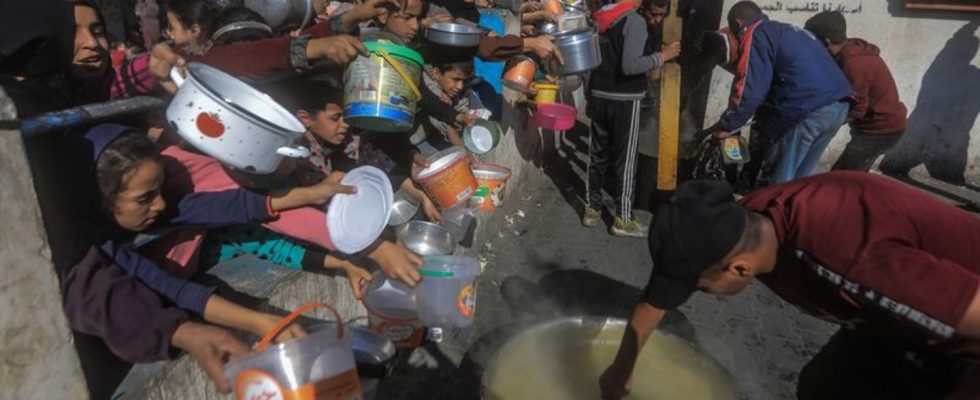War in the Middle East
Report: Fighting over aid deliveries in the Gaza Strip
Rafah in December: Palestinians gather with pots to receive food at a donation point set up by a charity. The humanitarian situation in the Gaza Strip is catastrophic after five months of war. photo
© Mohammed Talatene/dpa
The people in the Palestinian territory are currently receiving even less help than before. Footage from the US broadcaster CNN shows the drastic effects of their plight.
Given the great need in the… According to a US media report, there were violent clashes over aid supplies in the Gaza Strip. Footage from CNN shows desperate men trying to secure aid deliveries dropped from the air, using whips.
According to the report, people initially swam and paddled out to sea to reach goods after a drop from an aid plane may have missed its target. According to reports, hundreds of Palestinians crowded onto beaches in the central Gaza Strip and in the south of the coastal area to receive parts of the delivery. The CNN footage shows how some people also used long wooden sticks to try to keep the crowd away from their goods that had been fished out of the sea.
The report also shows little girls and boys crowding around for aid supplies. Women and children in the northern coastal area also waited in long lines to get soup made from grains and dirty water, it said.
Catastrophic humanitarian situation, collapse of public order
The humanitarian situation in the Gaza Strip is catastrophic after five months of war. People are suffering from hunger and thirst because neither food nor drinking water is sufficient for the 2.2 million people in the coastal area. According to the UN, the amount of aid delivered in February was halved compared to the previous month. United Nations officials warn that thousands of civilians are starving to death.
According to the UN emergency agency OCHA, there are also signs that public order in the Gaza Strip is collapsing as a result of the war. There are gangs that want to enrich themselves through aid deliveries, said OCHA spokesman Jens Laerke in Geneva. Trucks carrying relief supplies are often stopped and emptied just a few hundred meters behind the border. The goods later appeared on black markets. According to information, there is practically no police presence anymore.
OCHA and other aid organizations criticize Israel for not allowing enough aid deliveries. Israel, for its part, says the organizations work too slowly in transporting and distributing goods. The World Food Program (WFP) recently said that the conditions in the Gaza Strip hardly allow humanitarian deliveries. Helpers would be hindered and convoys would be looted.

